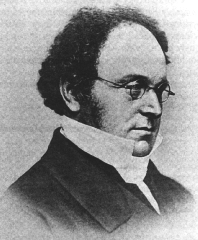
“My opinion of mankind is founded upon the mournful fact that, so far as I can see, they find within themselves the means of believing in a thousand times as much as there is to believe in, judging by experience.” — Augustus De Morgan

“My opinion of mankind is founded upon the mournful fact that, so far as I can see, they find within themselves the means of believing in a thousand times as much as there is to believe in, judging by experience.” — Augustus De Morgan

There are three species of creatures who when they seem coming are going,
When they seem going they come: Diplomats, women, and crabs.
— John Hay, in The Library of Wit and Humor, Prose and Poetry, 1884
Onomasticist Elsdon Coles Smith keeps a file on unfortunately named law firms. His list includes Ketcham & Cheatham in New York, Wind & Wind in Chicago, Ruff & Ready in Miami, and Dilly, Dally, Doolittle & Stahl in Akron.
Novelist Paul Auster insists he encountered an Irish firm called Argue & Phibbs. (“This is a true story. If there are those who doubt me, I challenge them to visit Sligo and see for themselves if I have made it up or not.”)
And Lyle Bland’s lawyers, in Thomas Pynchon’s Gravity’s Rainbow, are Salitieri, Poore, Nash, DeBrutus & Short.

Between 1884 and 1896, visitors to Coney Island could stay in an elephant. Each leg of the tin-skinned wooden behemoth was 60 feet long; its ears were 40 feet wide; and the enormous trunk measured 72 feet. The forelegs housed a diorama and a cigar store, and the hind legs contained staircases leading to 31 hotel rooms above — advertised entertainingly as “a main hall head room, 2 side body rooms, 2 thigh rooms, 2 shoulder rooms, 2 cheek rooms, 1 throat room, 1 stomach room, 4 hoof rooms, 6 leg rooms, 2 side rooms, 2 hip rooms, 1 through room from which the Elephant is feeding.” (Presumably this last carried a discount.)
The hotel idea didn’t work out, and in the end the building served mostly as a concert hall and amusement bazaar, with novelty stalls, a gallery, and a museum. Visitors could use telescopes to peer out of the monster’s glass eyes, and it was said that the mists of Niagara could be seen from the howdah on its back, which teetered at a height of 175 feet.
The contractor that built the colossus said that it would last half a century, but within 12 years it had been abandoned and burned to the ground. All that remained was part of a foreleg.
If your first line ends with cow,
Rhyme o w with plough;
Should your second nicely go,
Seek o long, as found in though;
Thirdly, would you try this too,
Double o is found in through;
Fourth, a variance we are taught,
Like an a u is heard in thought;
Speak you, fifthly, of a sorrow,
Give the o obscure in borough;
In the sixth place, you may pick up
Sound of u p in a hiccough;
Turn your seventh couplet off,
Assuming o f as in cough;
Eighthly, sing you of a rock,
Echo c k with a lough;
Ninth and last, and quantum suff,
Sound u f, and cry,–enough!
— I.J. Reeve, in The Wild Garland; or, Curiosities of Poetry, 1865
Pianist Pete Brush was waiting for his wife outside a midtown department store when a woman with a violin case approached him and asked, “How can I get to Carnegie Hall?”
He said, “Go uptown to 57th Street and make a left to 7th Avenue.”
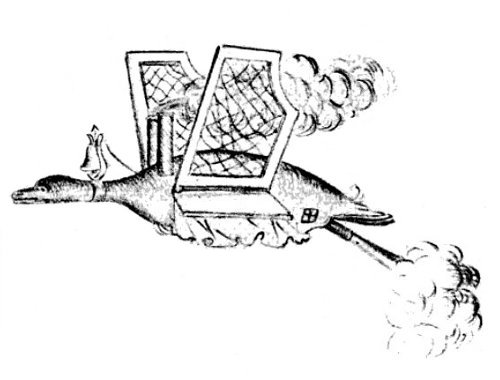
In 1841 a Richard Oglesby Davidson proposed building a flying machine in the shape of an eagle. We know this only because an anonymous Kentucky satirist followed it up with plans for a duck-shaped, steam-powered aërostat of his own — and, as so often, the satire has outlived its target.
The duck was to have been 15 feet long, with wings of whalebone and silk, and contained a steam engine and a small cabin. “I have made a calculation to ascertain the power of the Steam Duck, which, I think proves conclusively that success is inevitable:”
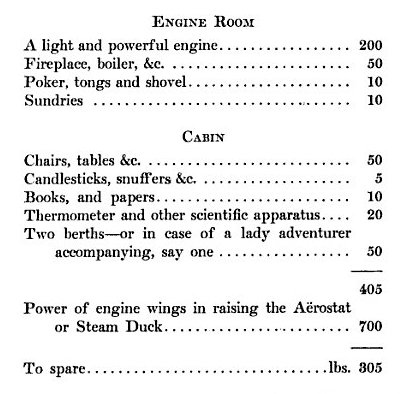
As to the danger from sportsmen, “any one of common sense can perceive that there never was a real bird with a scape-pipe in the situation described; nor wings shaped and constructed as those of the ‘steam duck’: yet it might not be amiss to attach to the works an alarm-bell, which would prevent all possibility of mistake.” One wonders if Davidson thought of this.
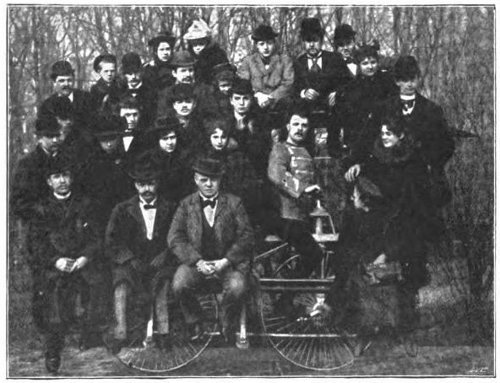
The hero of this exploit (it is a little difficult to locate him among so many) is Maurice Pardo–the “Herculean Human Motor,” as he modestly styles himself. This wonderful cyclist balances and propels, solely by his own power and skill, twenty-five persons on his specially-made machine, which is unquestionably of the two-wheeled variety; whether or not it may be styled a ‘safety,’ however, is rather for the human cargo to say. The total weight on the bicycle is a little more than 4,000 lb.
— Strand, October 1896
logomach
n. one who fights over words
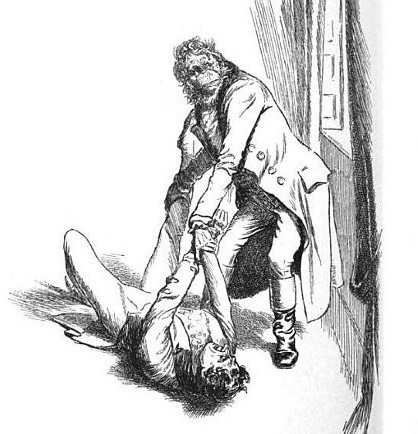
Should other species be regarded as human? In 1779 Lord Monboddo proposed that orangutans should: They walk upright, use weapons, form societies, build shelters, and behave with “dignity and composure.” “If … such an Animal be not a Man, I should desire to know in what the essence of a Man consists, and what it is that distinguishes a Natural Man from the Man of Art?”
Thomas Love Peacock mocked this view in his 1817 novel Melincourt, in which a civilized orangutan (“Sir Oran Hout-ton”) is elected to Parliament. And an anonymous wag objected even to the satire:
The author of a novel lately written,
Entitled “Melincourt,”
(‘Tis very sweet and short),
Seems indeed by some wondrous madness bitten,
Thinking it good
To take his hero from the wood:
And though I own there’s nothing treasonable
In making ouran-outangs reasonable,
I really do not think he should
Go quite the length that he has done,
Whether for satire or for fun,
To make this creature an M.P.
As if mankind no wiser were than he.
However, those who’ve read it
Must give the author credit
For skill and ingenuity,
Although it have this monstrous incongruity.
But today Monboddo’s view is on the ascendancy. In Rattling the Cage (2014), Harvard legal scholar Steven M. Wise argues that orangutans — as well as chimpanzees, bonobos, elephants, parrots, dolphins, and gorillas — deserve legal personhood. “Ancient philosophers claimed that all nonhuman animals had been designed and placed on this earth just for human beings,” he writes. “Ancient jurists declared that law had been created just for human beings. Although philosophy and science have long since recanted, the law has not.”